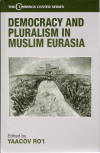 DEMOCRACY AND PLURALISM IN
MUSLIM EURASIA DEMOCRACY AND PLURALISM IN
MUSLIM EURASIA
Edited by Yaacov Ro'i
This
book is devoted to the study and analysis of the prospects for democracy among
the Muslim ethnicities of the Commonwealth of Independent States (CIS), both
those that have acquired full independence and those remaining within the
Russian Federation.
The nineteen Western academics and scholars from the Muslim
countries and regions of the CIS who contribute to this volume view the
establishment of democratic institutions in this region in the context of a wide
and complex range of influences, above all the Russian/Soviet political legacy;
native ethnic political culture and tradition; the Islamic faith; and the
growing polarity between Western civilization and the Muslim world.
The trend of democratization is not always linear. Nor can
democracy be judged by the same standards in all societies. The new Muslim
states of the CIS and the Muslim peoples of the Russian Federation are intent on
constructing their societies on the basis of their own traditional culture and
customs. The issues involved in seeking democratic models which can be adapted
to societies which are Islamic and have significant, even dominant ethnic groups
and strong authoritarian legacies are certainly relevant to other regions of the
world and have implications for the challenges being faced today in Afghanistan
and Iraq.
The essays included in this volume demonstrate that, despite the
short-term obstacles on the path of democracy and pluralism and on the
establishment of a true market economy and an effective civil society, there are
forces at work which might make it possible to forge ahead.
On ne peut donc que saluer la publication de ce recueil et mentionner son
importance dans le spectre de la recherche occidentale sur l'Asie centrale et
plus généralement le monde musulman post-soviétique.
Sebastien Peyrouse
Cahiers du Monde russe et
soviétique
"...historically grounded and timely volume...it
asks fascinating questions about crucial, if understudied, parts of Eurasia...
Edward Schatz
The Russian Review
CONTRIBUTORS:
Farda
Asadov ▪ Vladimir Babak ▪Svante Cornell ▪ Zhanylzhan Dzhunusova ▪ Moshe
Gammer ▪ Ildus Ilishev ▪ Vladimir Khanin ▪ Enver Kisriev ▪ Pål Kolstø ▪ Alexei
Kudriavtsev ▪ Leonid Levitin ▪ Neil J. Melvin ▪ Vladimir Mesamed ▪ Rafik M.
Mukhametshin ▪ Saodat Olimova ▪ Richard Pomfret ▪ Yaacov Ro’i ▪ Azade-Ayse
Rorlich ▪ Dov Yaroshevski
Contents
PREFACE
GLOSSARY
INTRODUCTION
PART I:
HISTORICAL BACKGROUND
1. The Democratic Tradition of Kazakhstan in Historical Context Zhanylzhan
Dzhunusova
2. Elements of Democracy in Dagestan on the Eve of the
Russian Conquest
Moshe Gammer
3. The Challenge of
Belonging: The Muslims of Late Imperial Russia and the Contested Terrain of
Identity and Gender Azade-Ayse Rorlich
4. The Hidden Dialogue on
Constitutionalism Between the Russian Provisional Government and the Khivan
Democracy in 1917 Dov Yaroshevski
PART II:
POTENTIAL PRESSURE POINTS
5. Aid and Ideas:
The Impact of Western Economic
Support on
the Muslim Successor States
Richard Pomfret
6. Islam in the FSU – An
Inevitable Impediment to Democracy? Yaacov Ro’i
PART III:
MUSLIM SUCCESSOR STATES
7. Authoritarian Pathways in
Central Asia: A Comparison of Kazakhstan, the Kyrgyz Republic and Uzbekistan
Neil Melvin
8. The Formation of Political
Parties and Movements in
Central Asia Vladimir Babak
9. The Price of Stability:
Kazakhstani Control Mechanisms under Conditions of Cultural and Demographic
Bipolarity Pål Kolstø
10. Liberalization in
Kyrgyzstan: ‘An Island of Democracy’
Leonid Levitin
11. Political Clans and
Political Conflicts in Contemporary Kyrgyzstan Vladimir Khanin
12. Linguistic Policy and the Process of Democratization in Uzbekistan
Vladimir Mesamed
13. Opposition in Tajikistan: Pro et Contra Saodat Olimova
14. Democracy and Civil Society Building in Independent Azerbaijan: Irrevocable
Changes or Temporary Diversion? Farda Asadov
PART
IV: MUSLIM REGIONS OF THE
RUSSIAN FEDERATION
15. Post-Soviet Tatarstan:
Democratic Strains in the Ideological Evolution of the Tatar National Movement
Rafik Mukhametshin
16. Nation-Building and Minority Rights in Post-Soviet Russia: The Case of
Bashkortostan Ildus Ilishev
17. The Political Process in
Dagestan: Prospects for
Democracy Enver Kisriev
18. Ethnic Relations and
Democratic Transition in the North-Western
Caucasus Svante Cornell
19. Democratic Values and
Political Reality in Chechnya, 1991_1999
Alexei Kudriavtsev
AFTERWORD
NOTES ON CONTRIBUTORS
INDEX
|
403 pp.
|
2004
| |
0 7146 52253
|
cloth
|
£
| |
|
|
|
| 